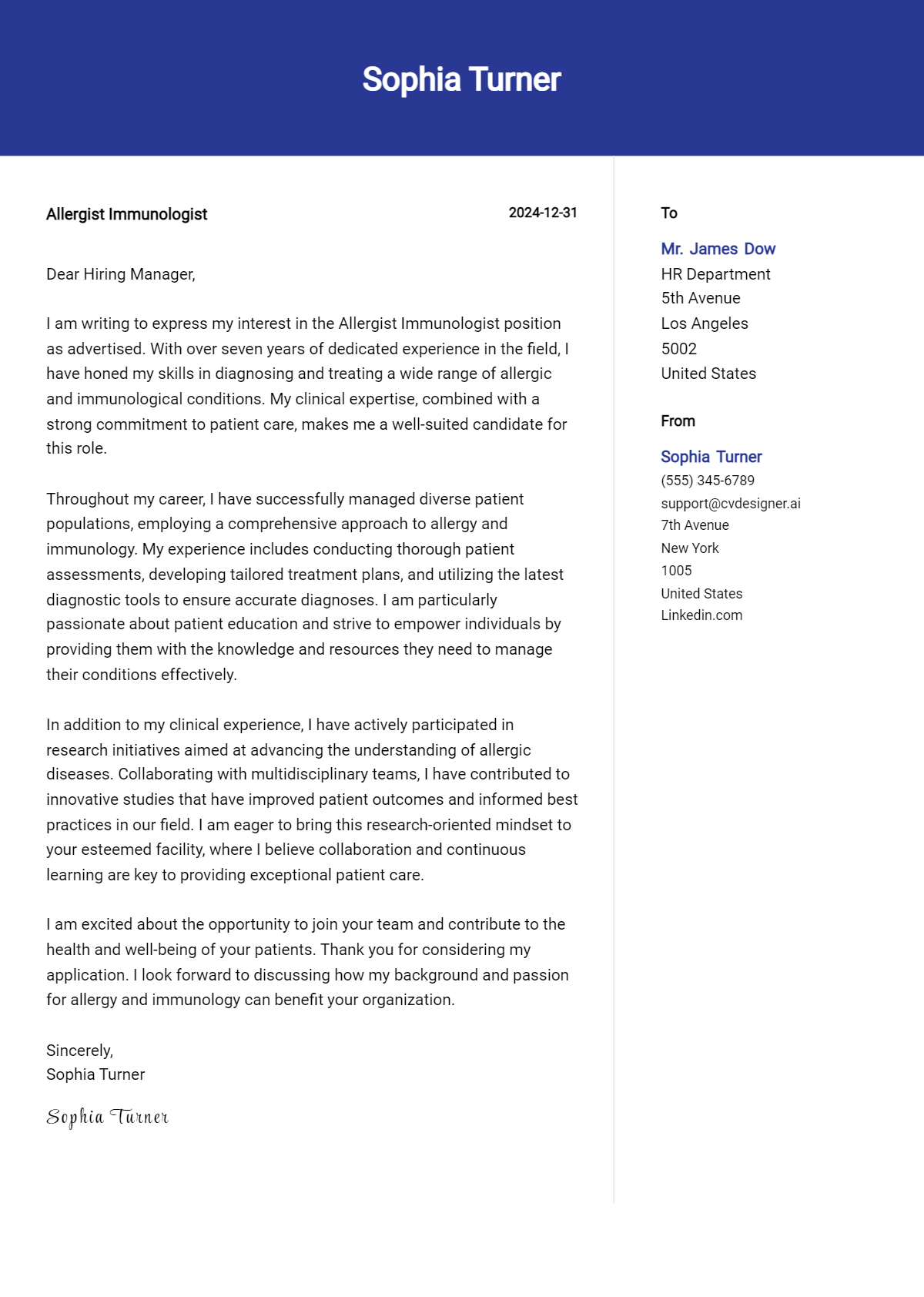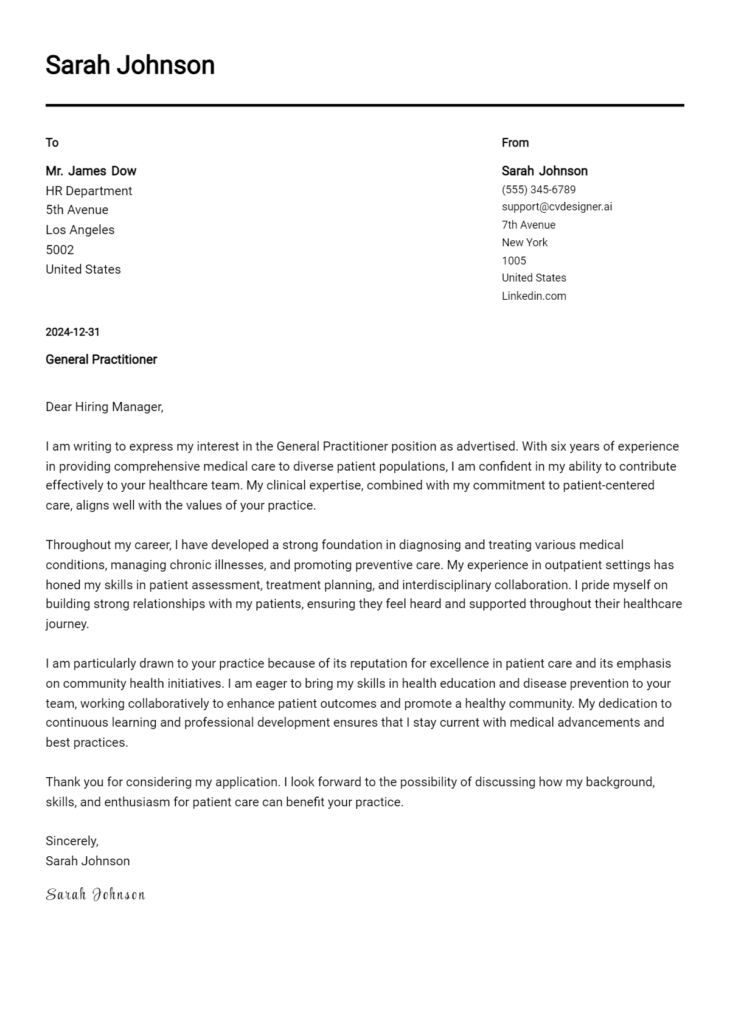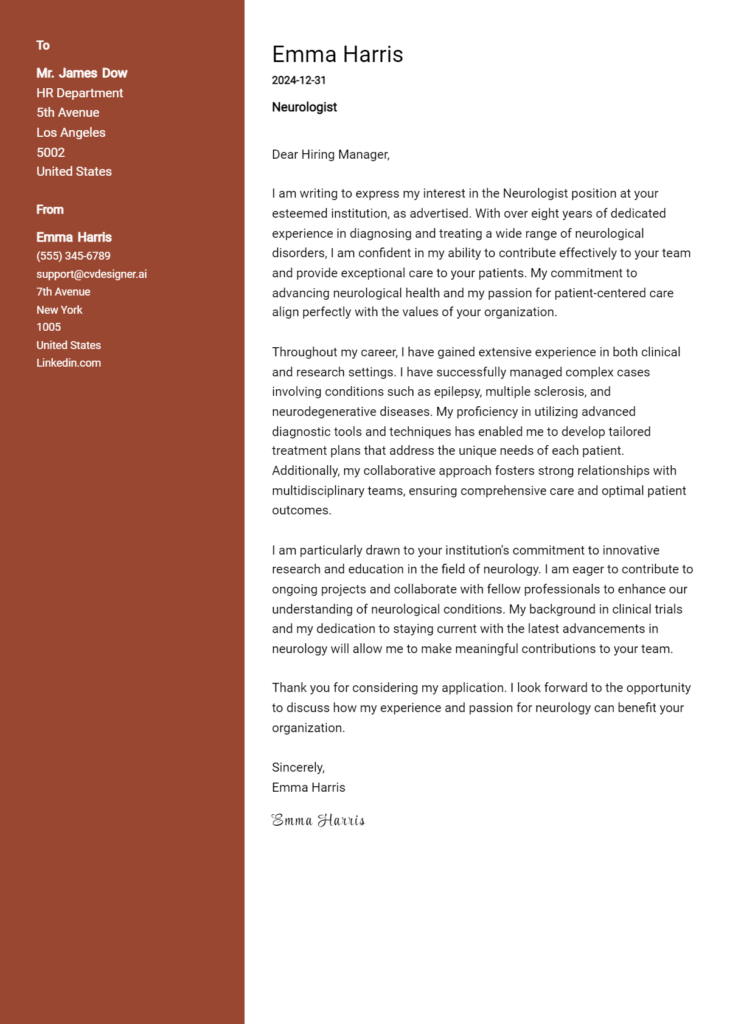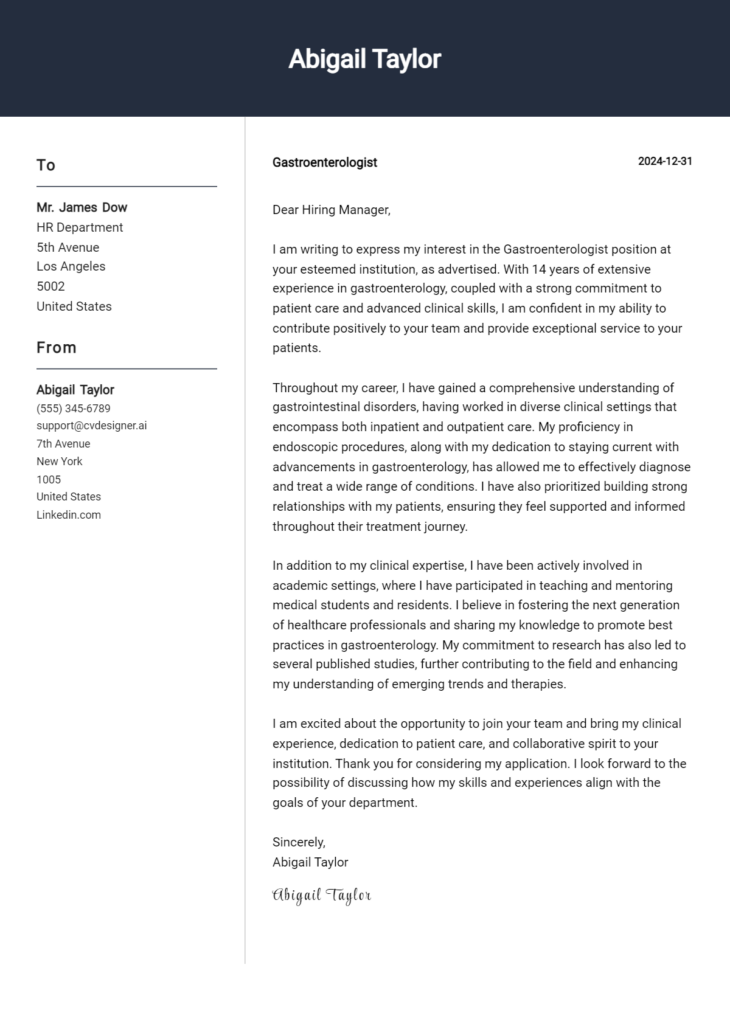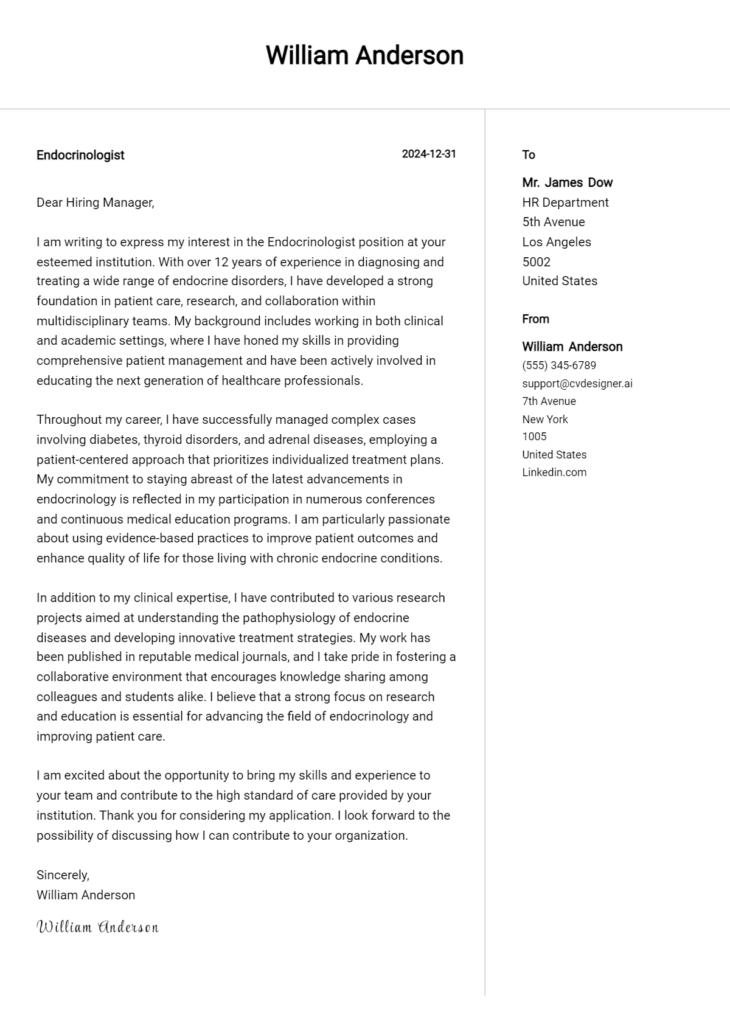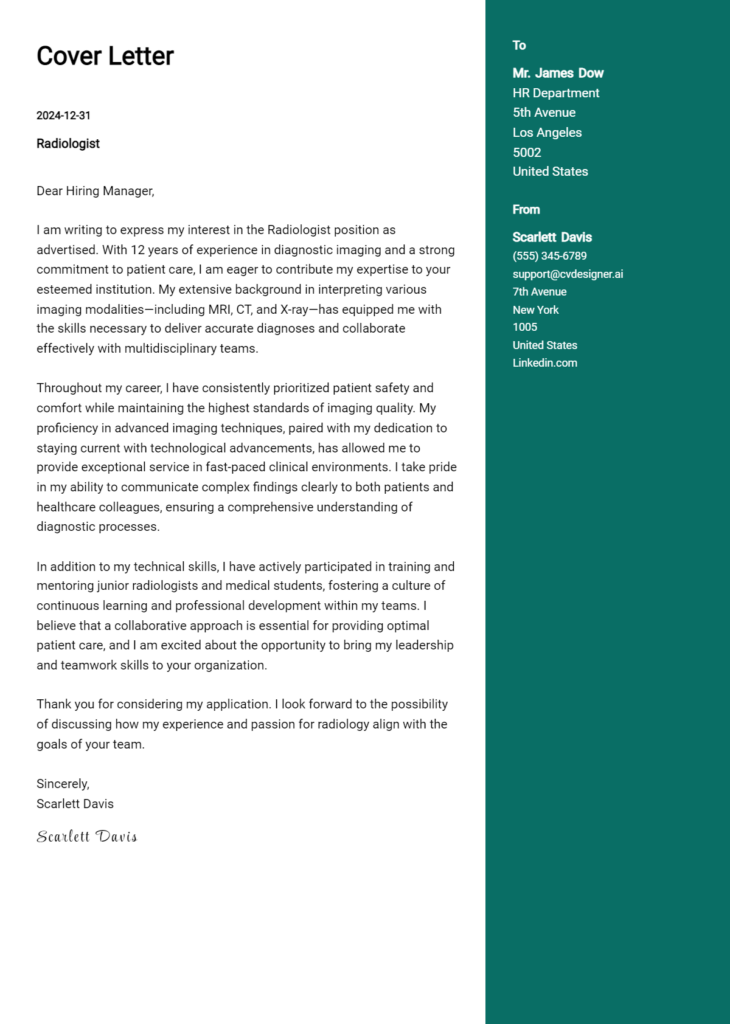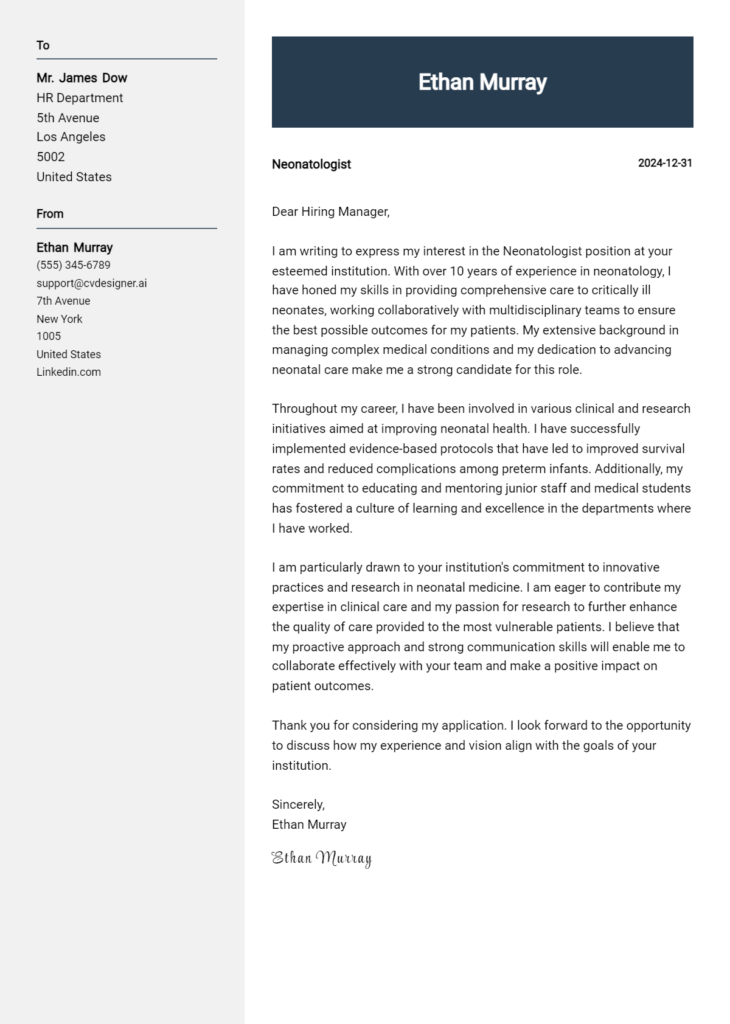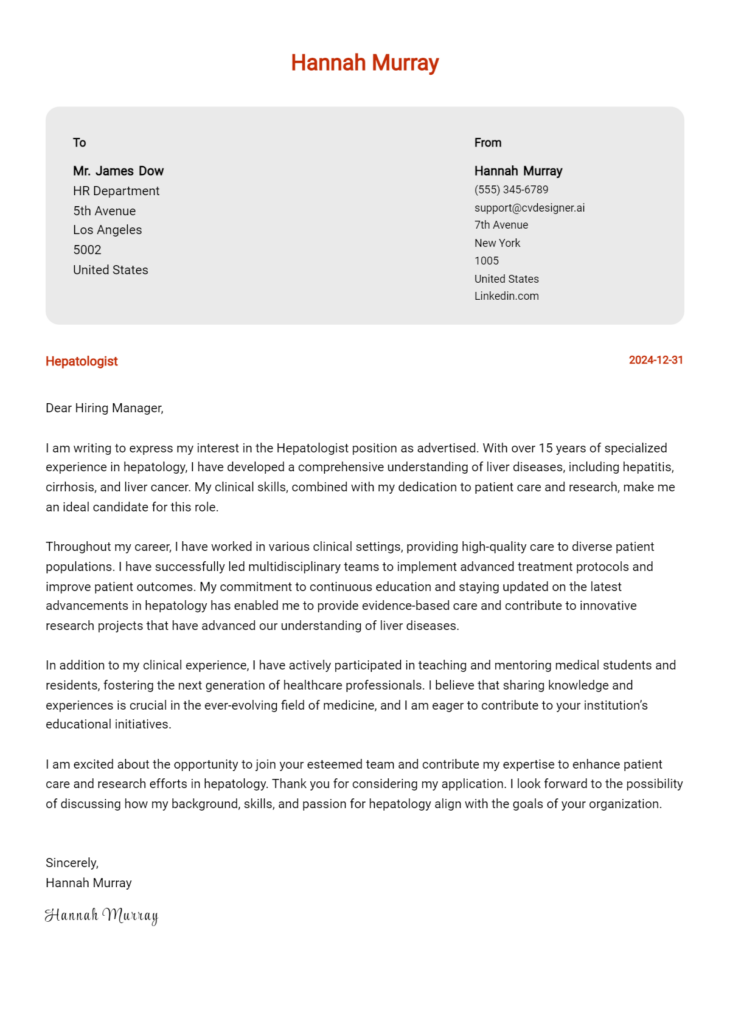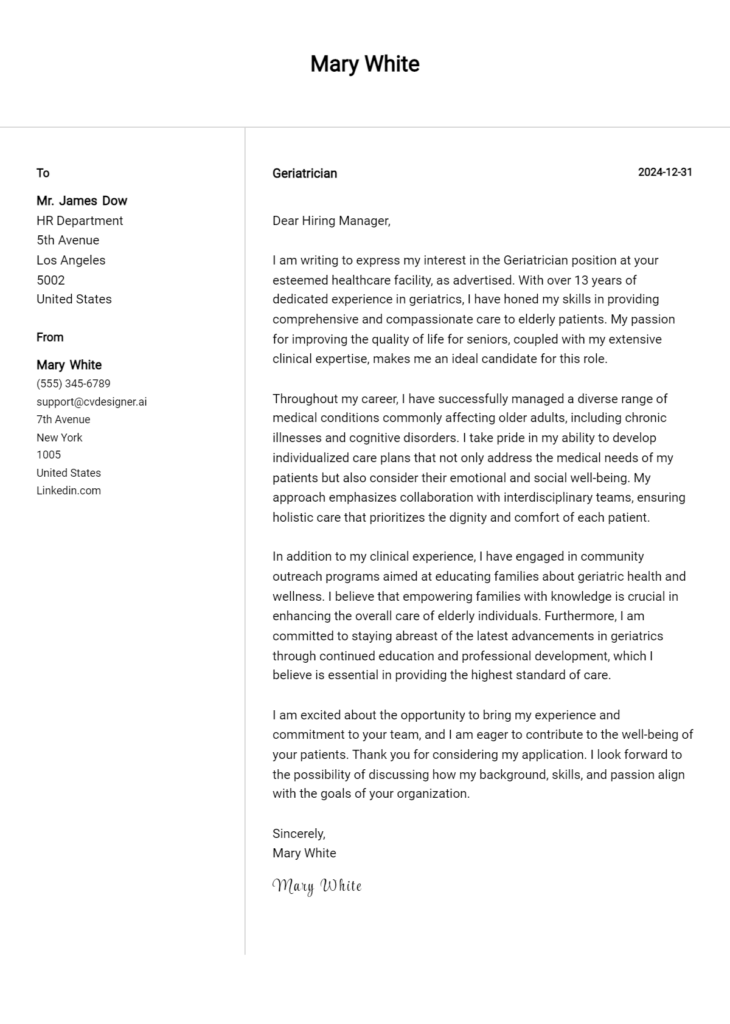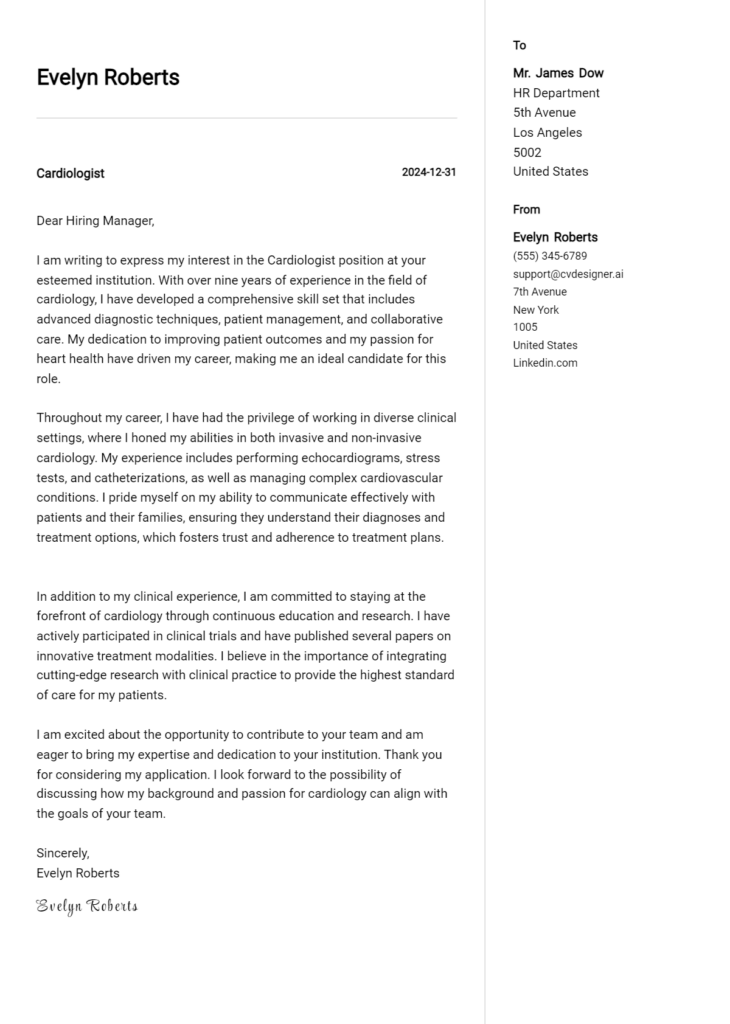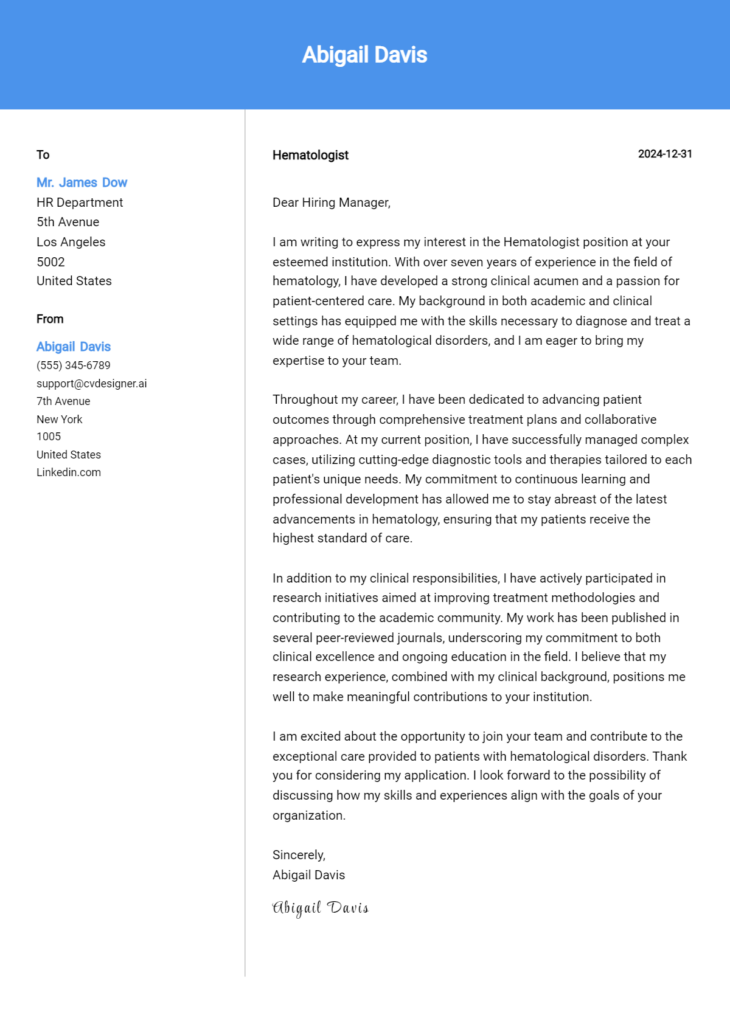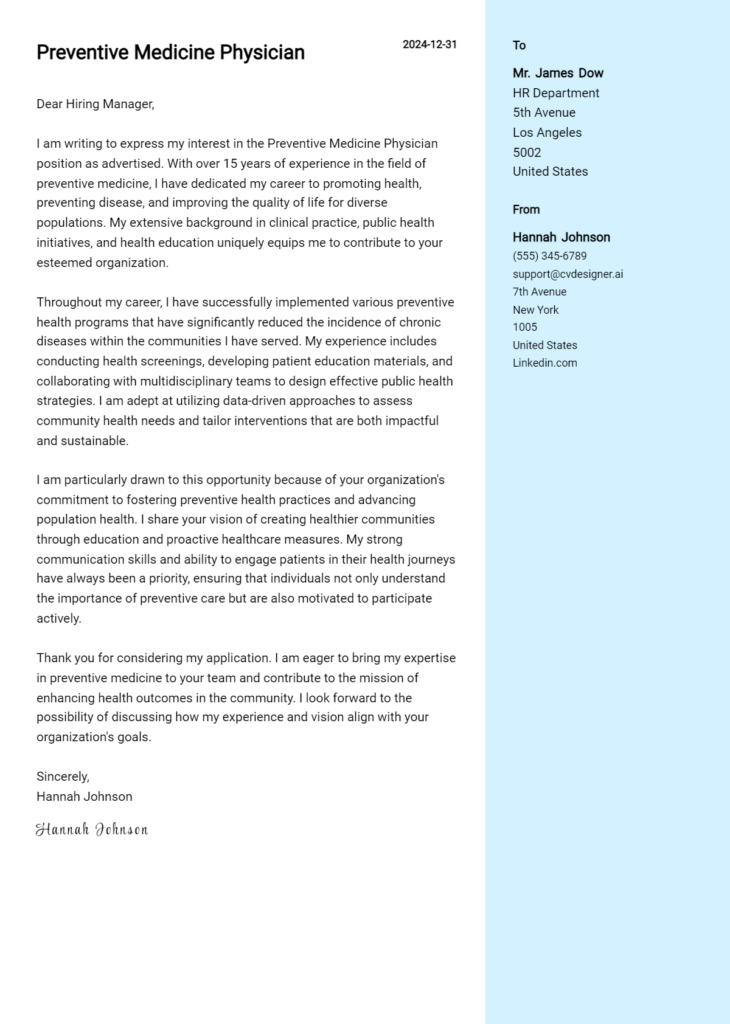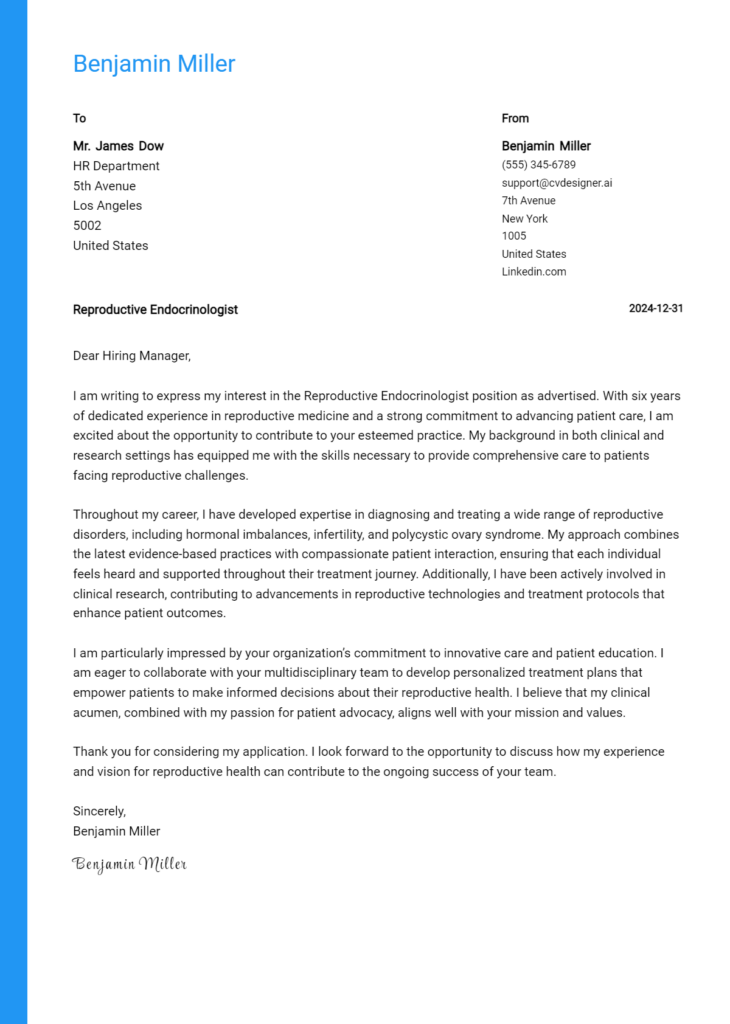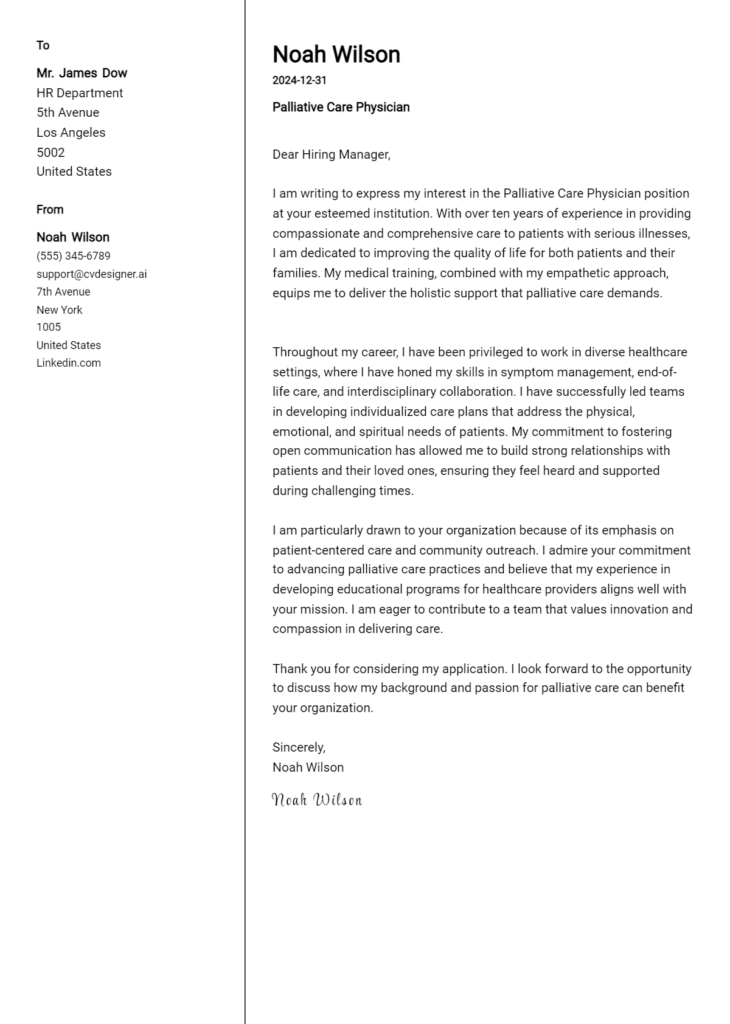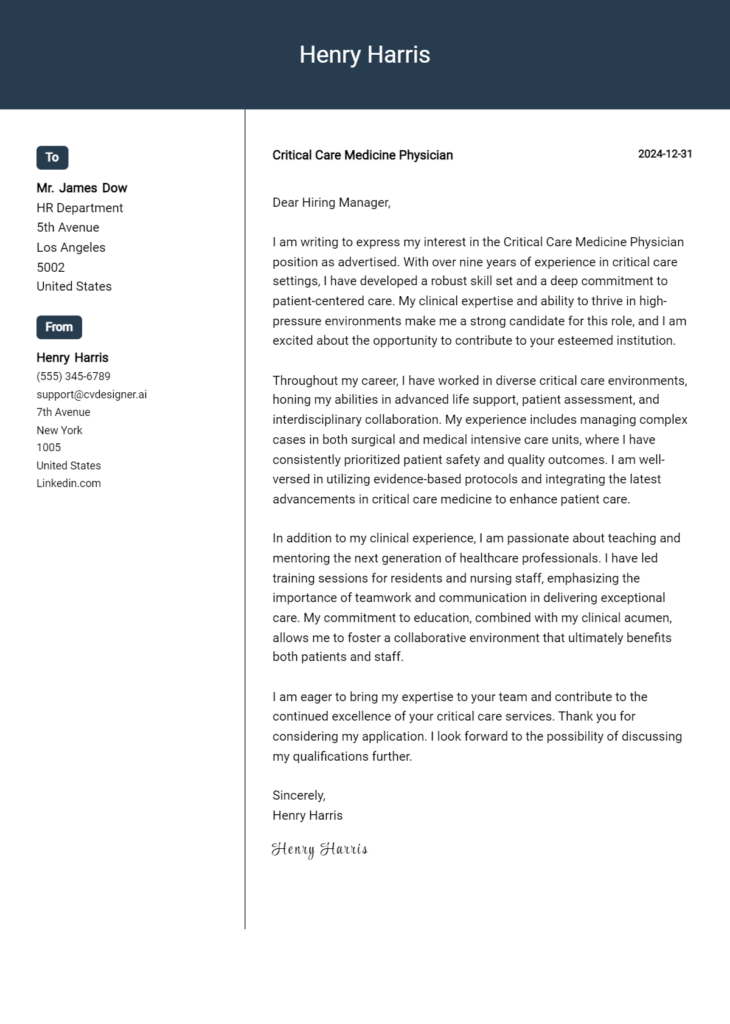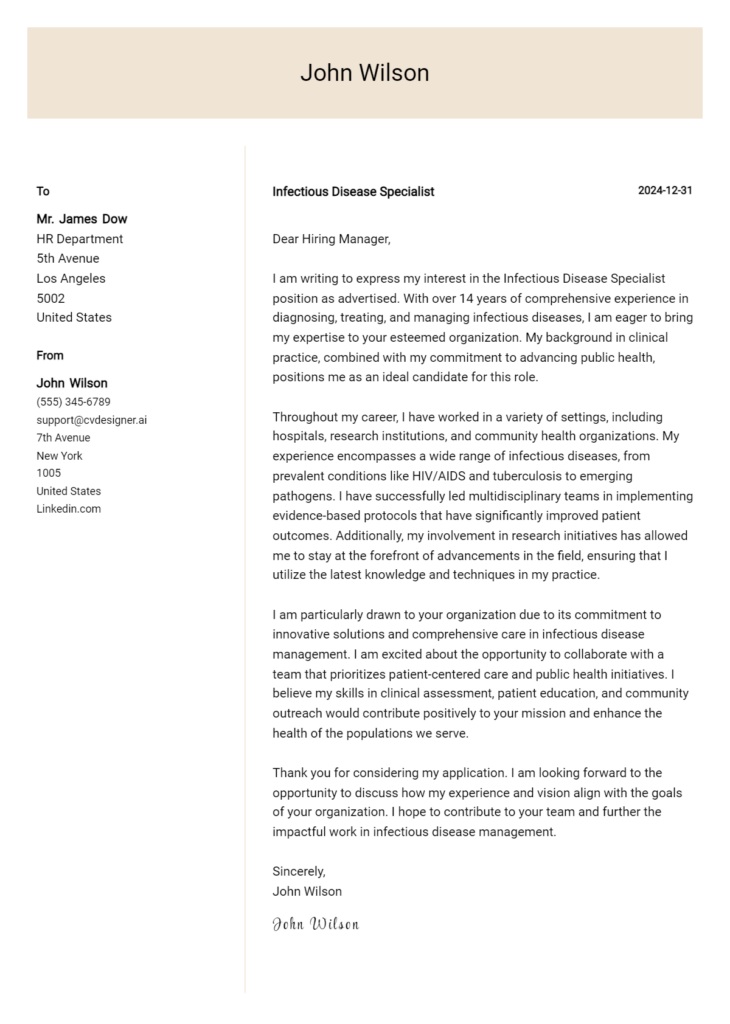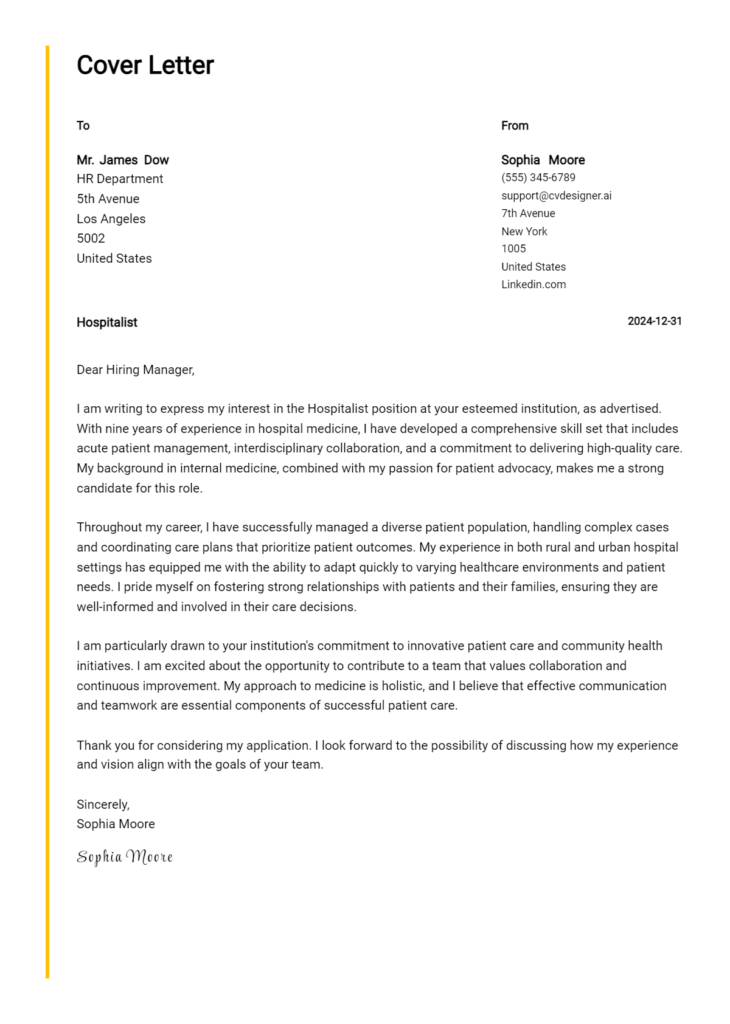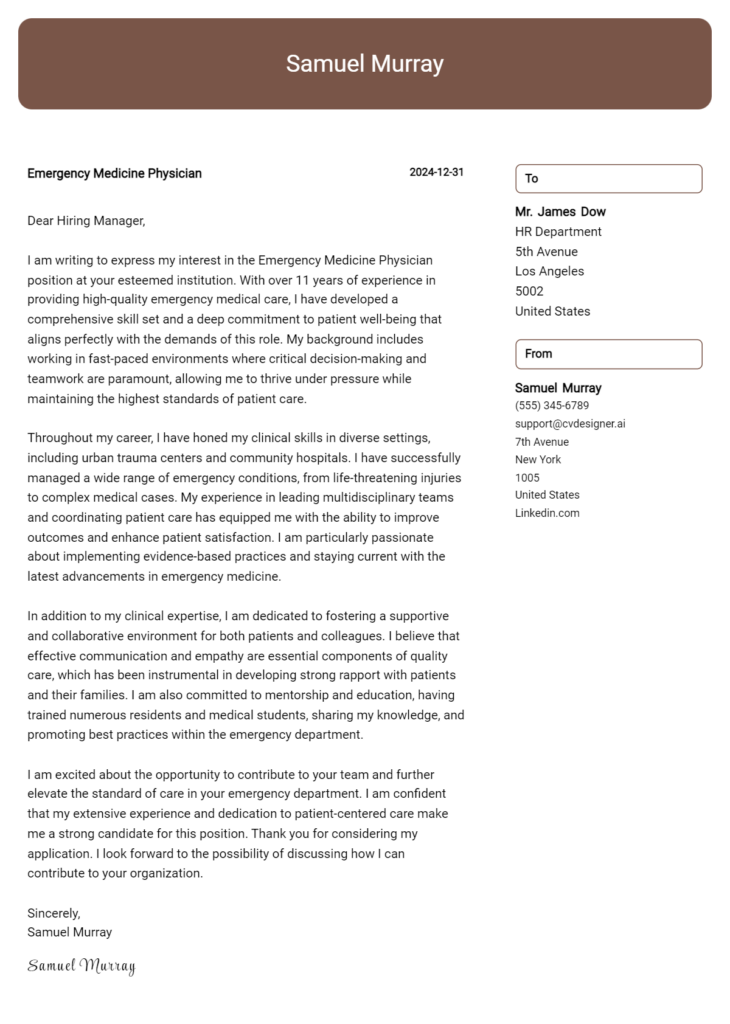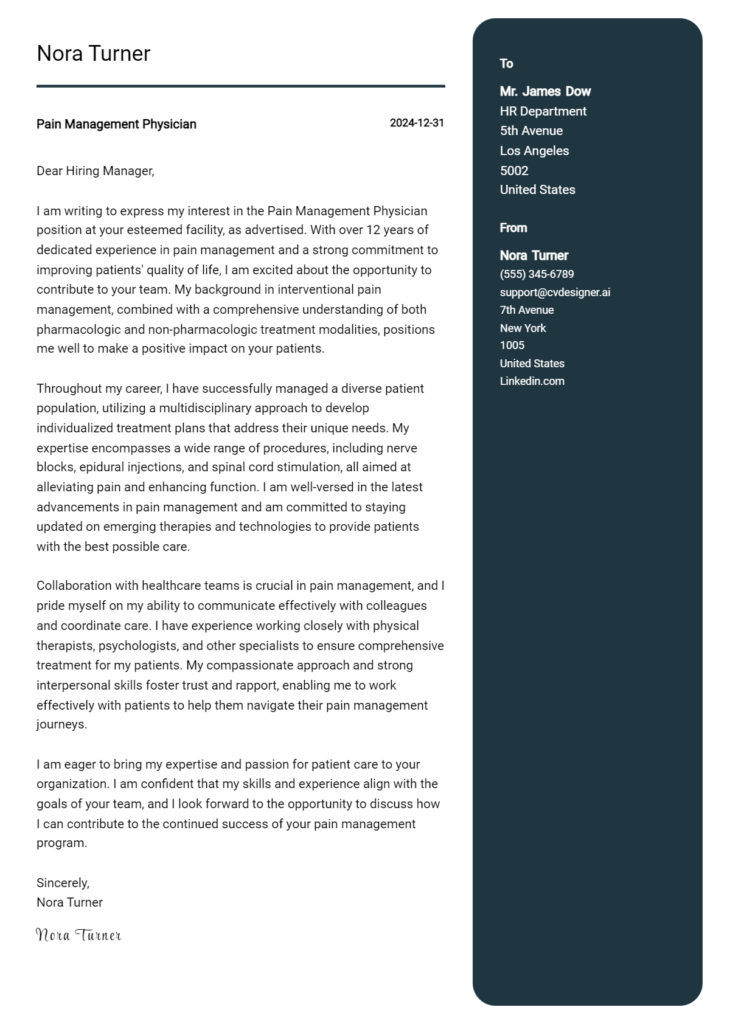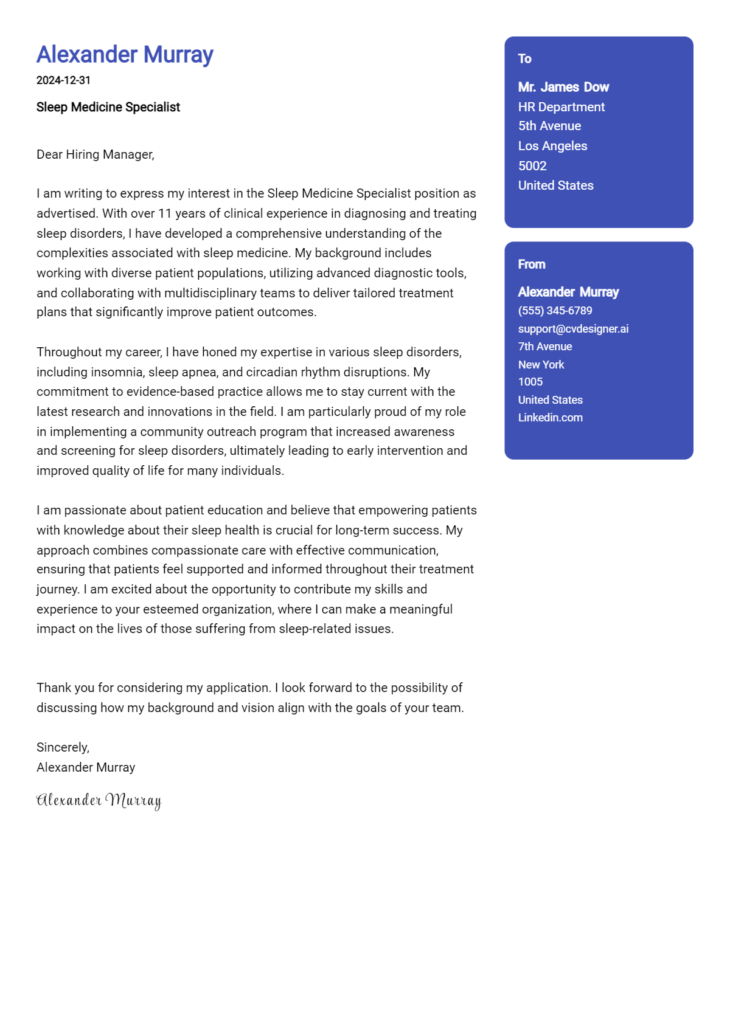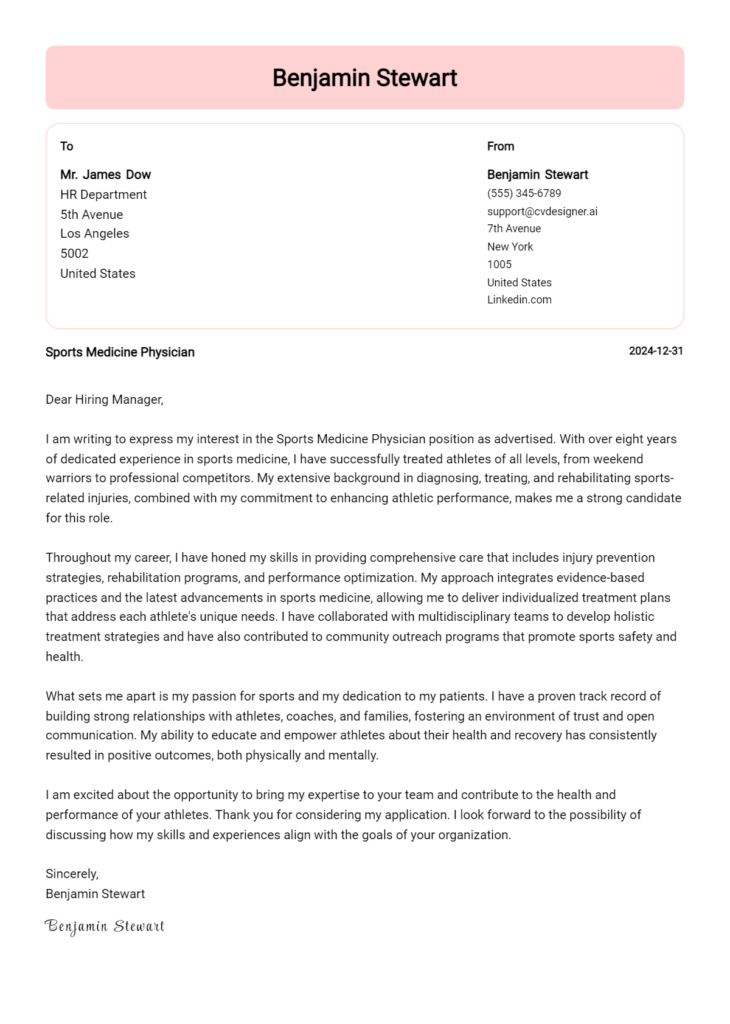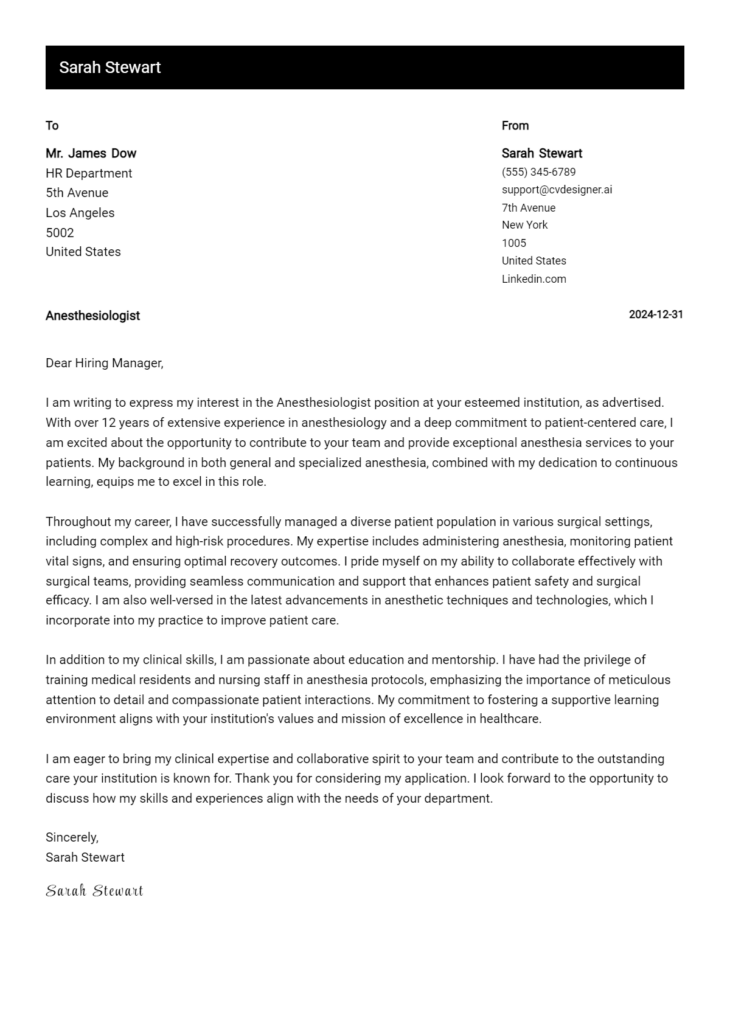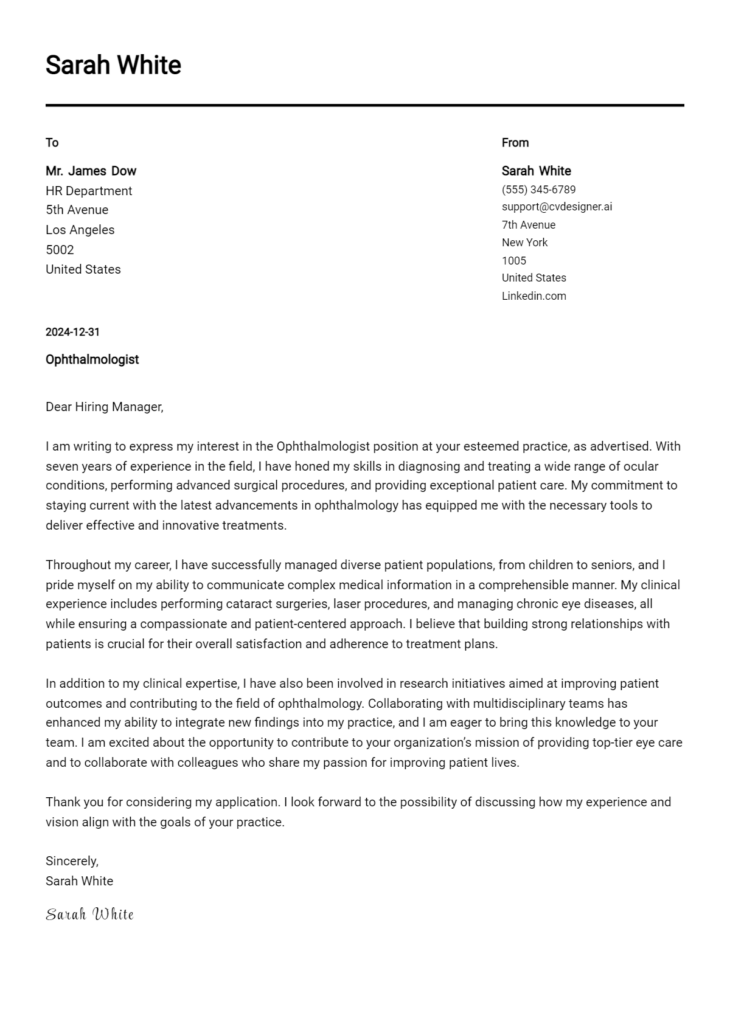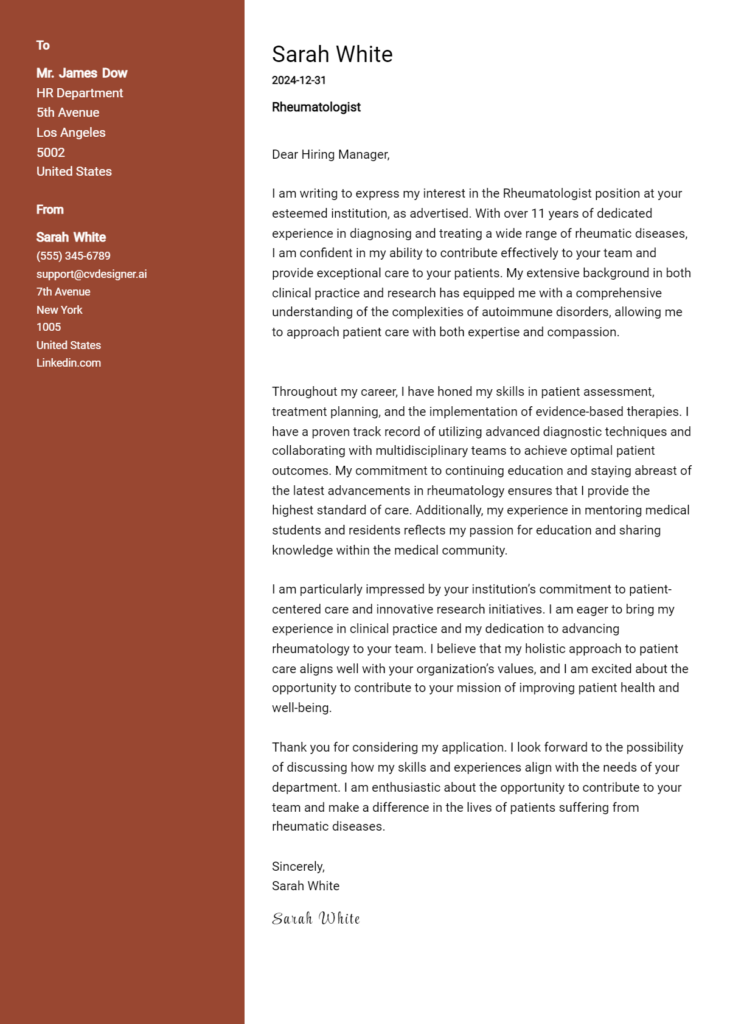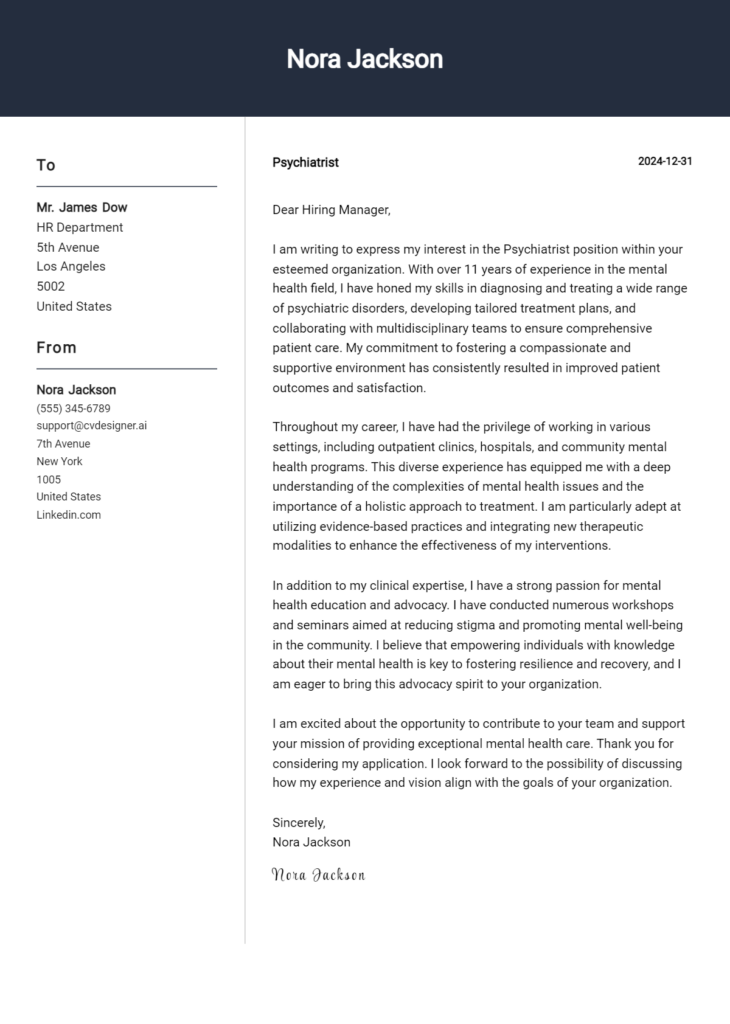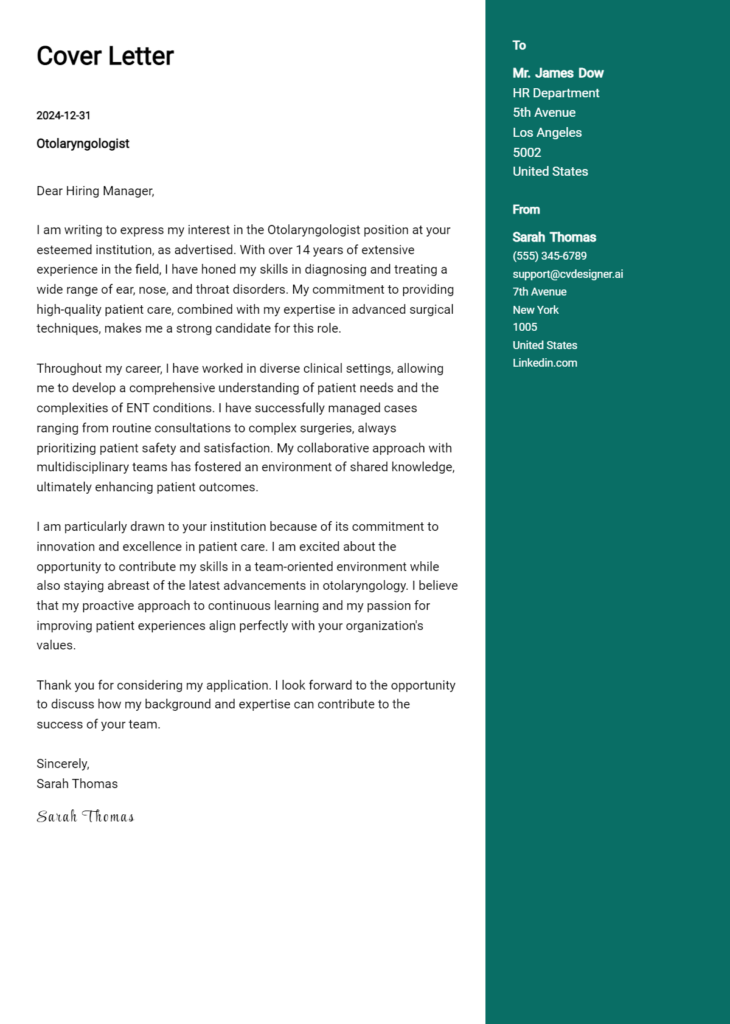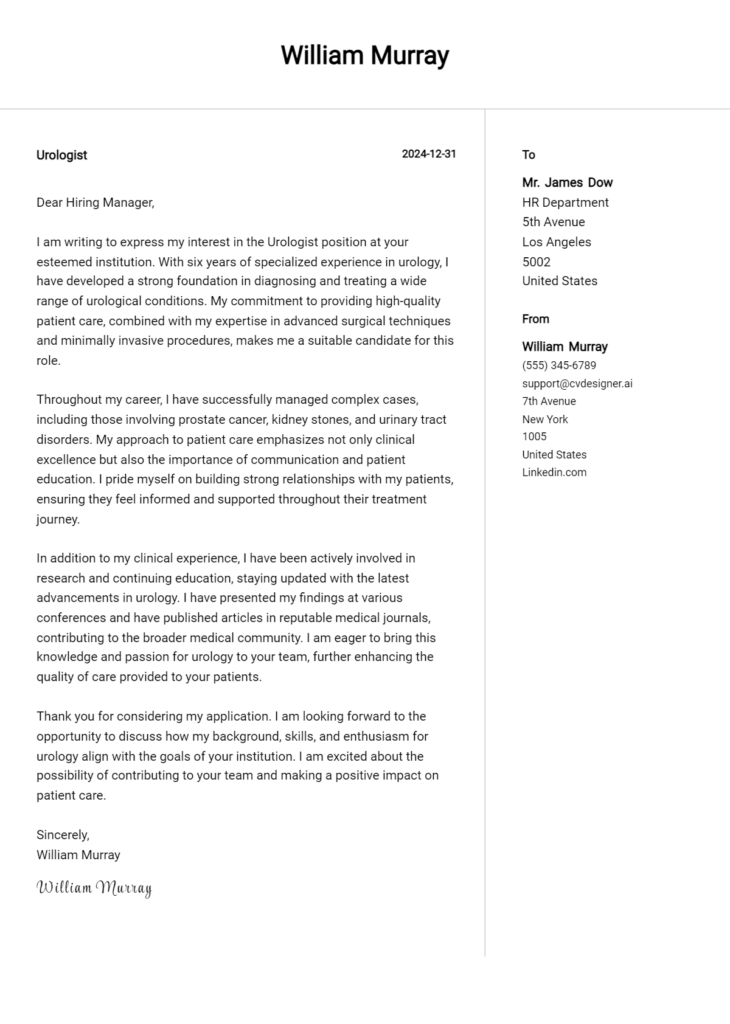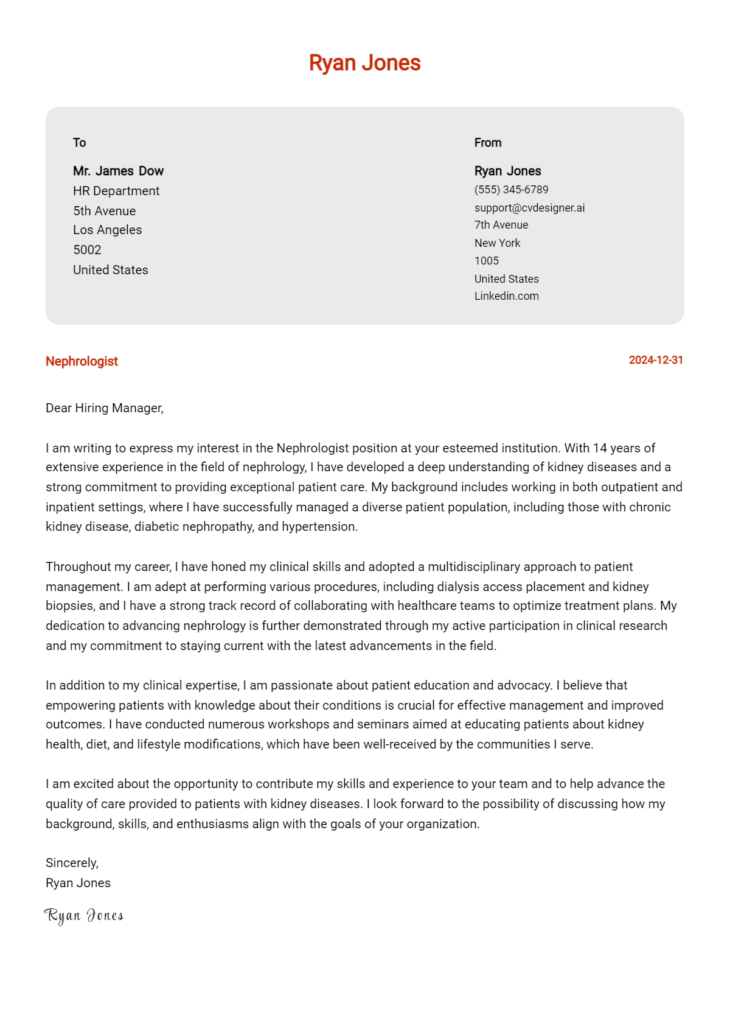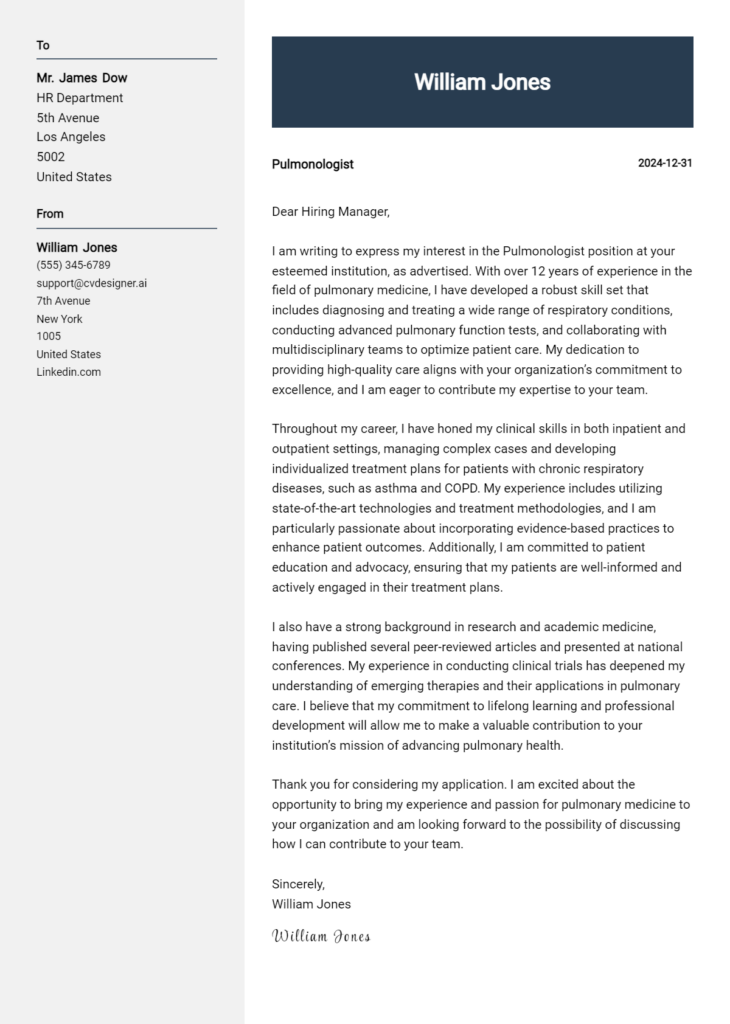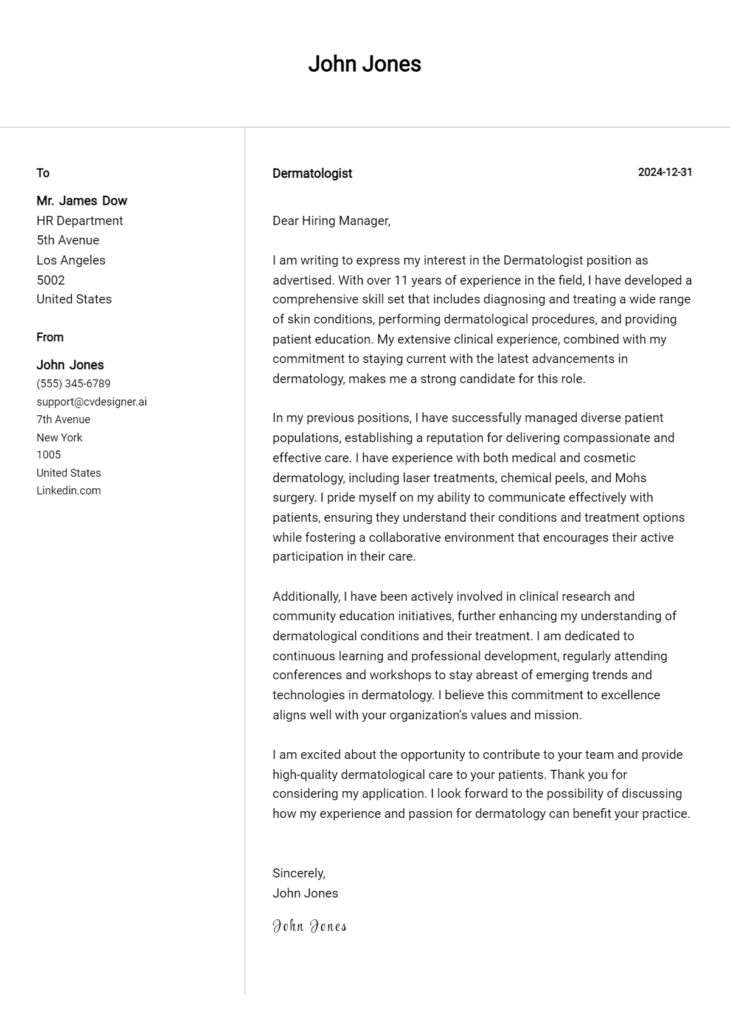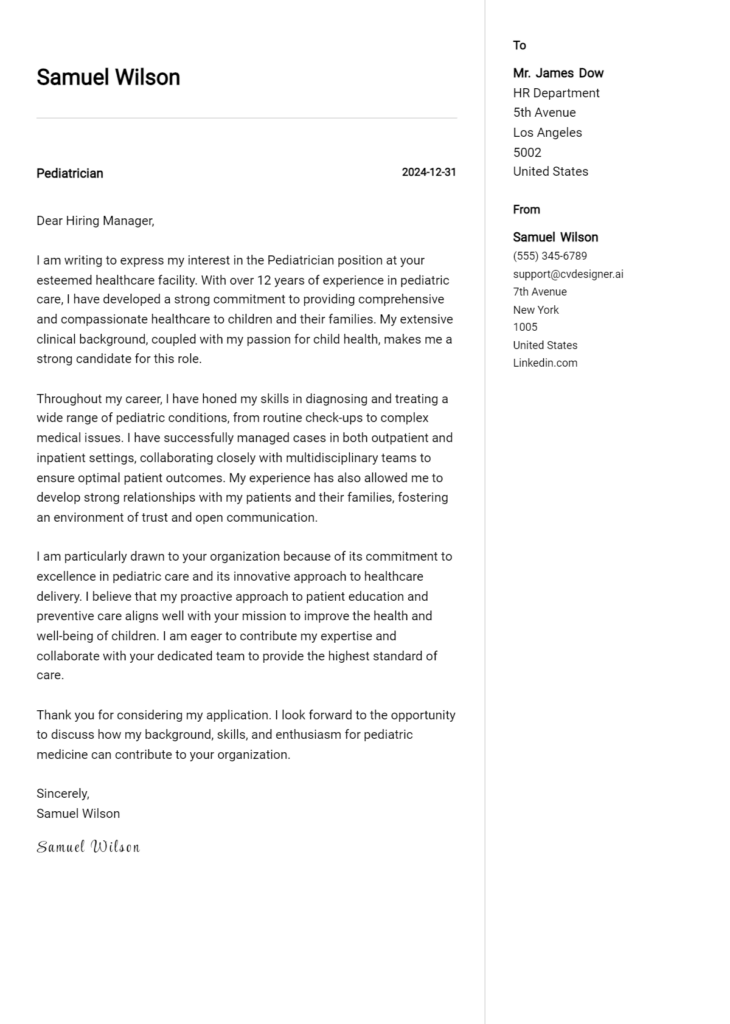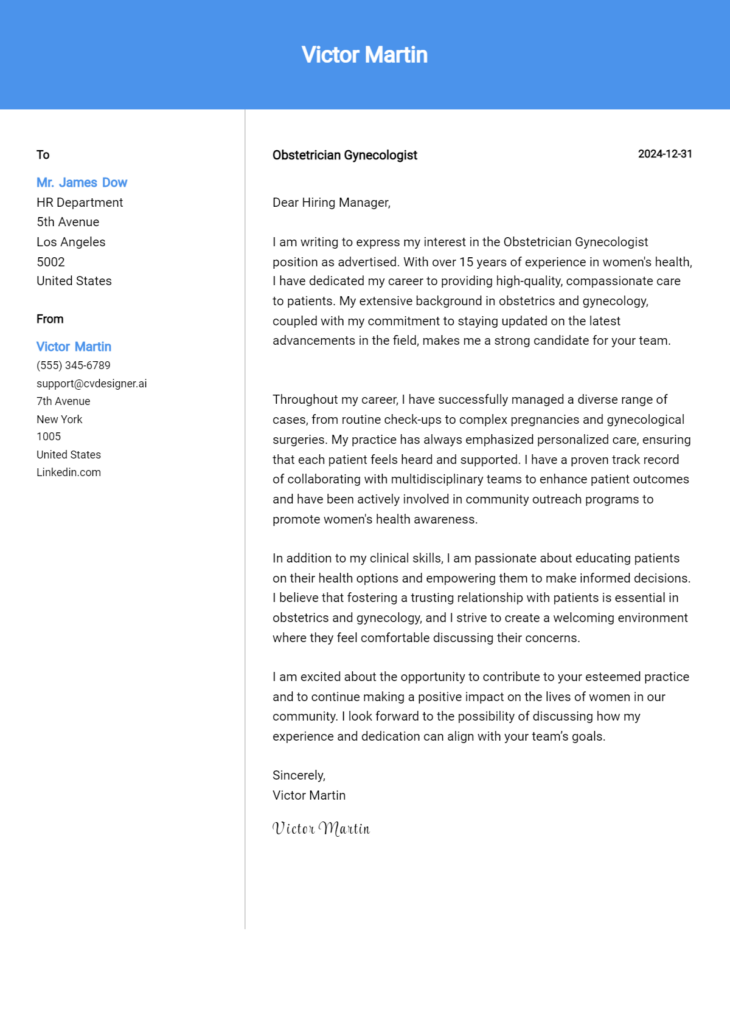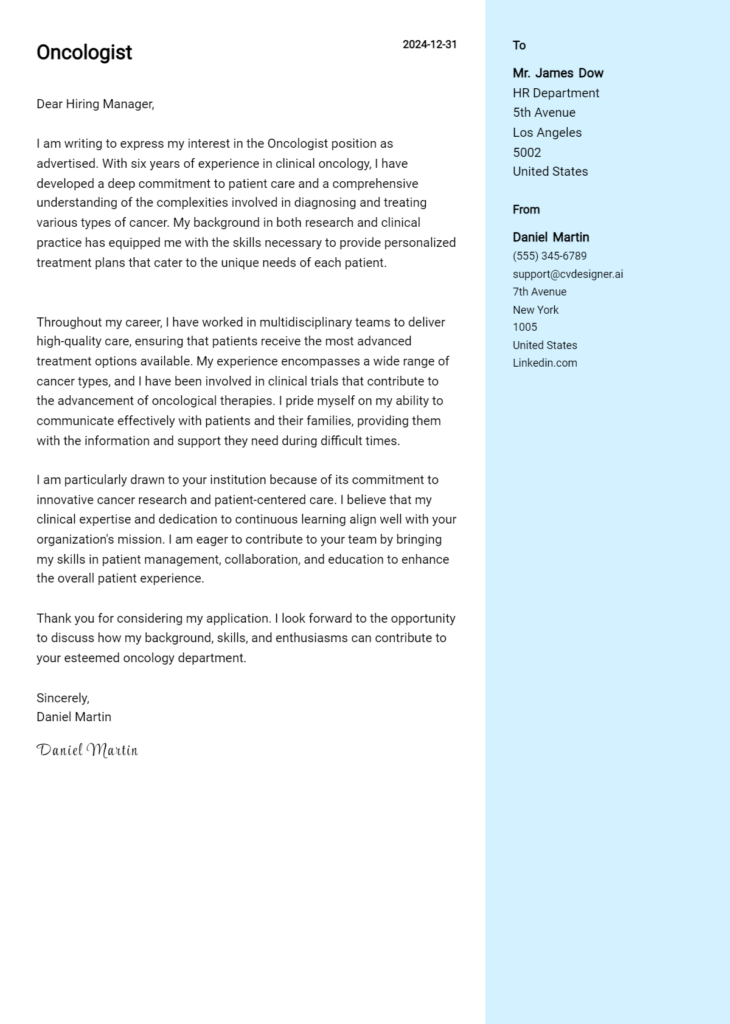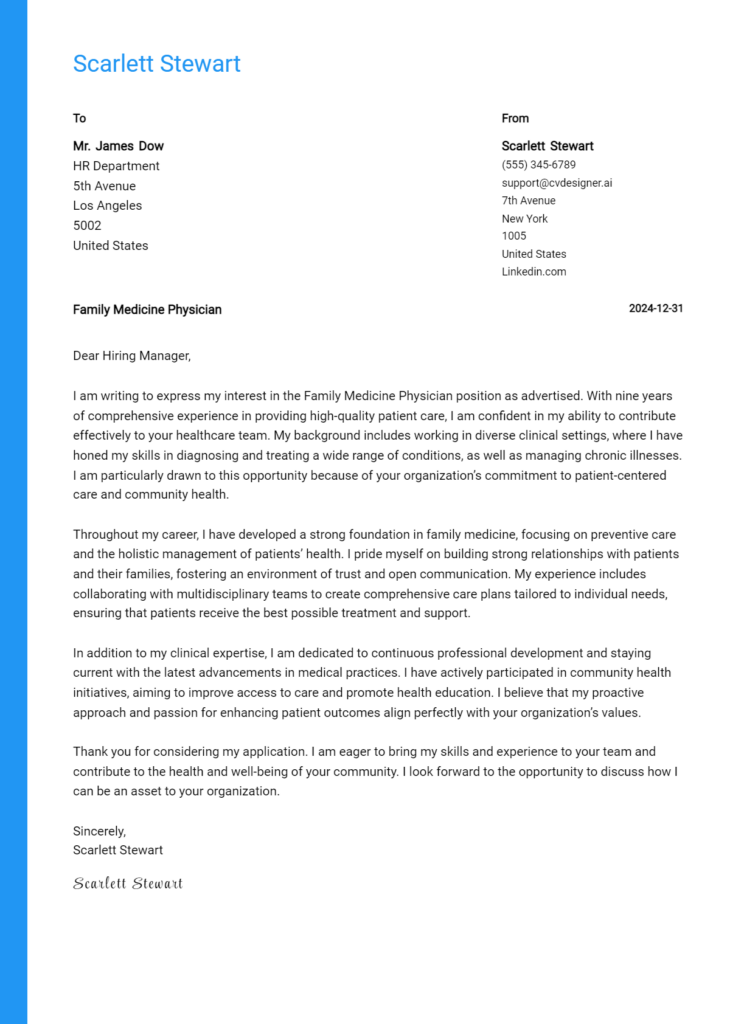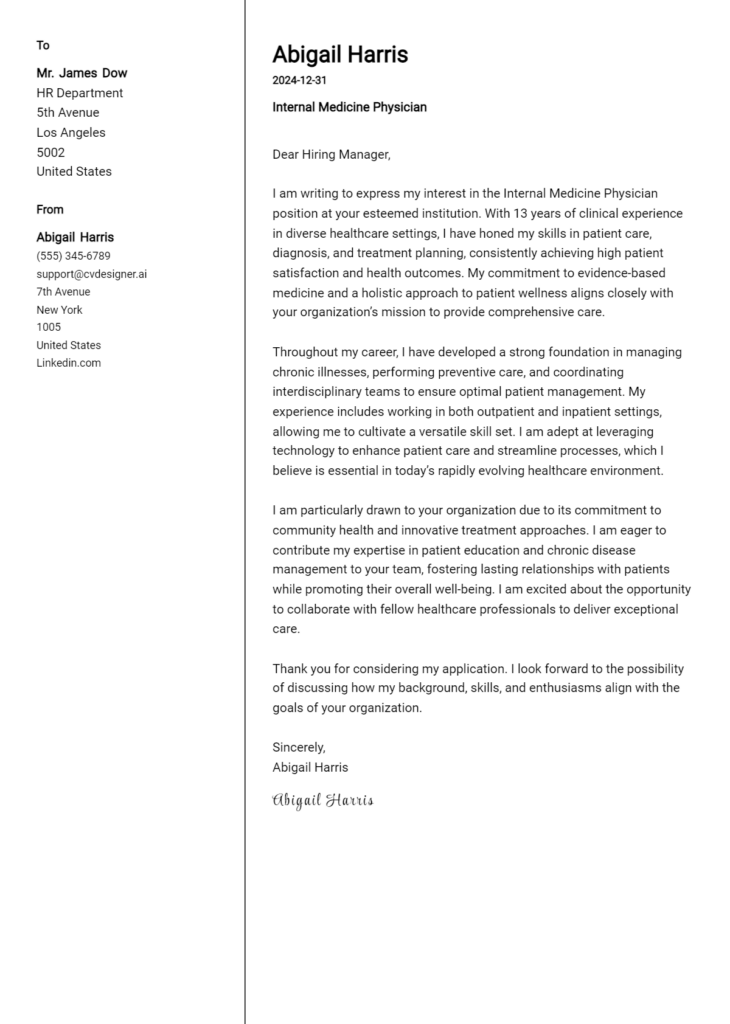Allergist Immunologist Cover Letter Examples
Explore additional Allergist Immunologist cover letter samples and guides and see what works for your level of experience or role.
How to Format an Allergist/Immunologist Cover Letter
Crafting a compelling cover letter is a vital step in the job application process for an Allergist/Immunologist. The way you format and present your qualifications not only showcases your medical expertise but also reflects your ability to communicate effectively—a crucial skill in the field of allergy and immunology. A well-structured cover letter captures the hiring manager's attention while emphasizing the precision and care required in your specialty.
In this guide, we'll outline how to properly format your cover letter, providing insights and allergist-specific examples to help you create a standout document.
We'll explore the essential components of a professional cover letter, including:
- Cover Letter Header
- Cover Letter Greeting
- Cover Letter Introduction
- Cover Letter Body
- Cover Letter Closing
Each section is important for highlighting your qualifications and professionalism in the medical field. Let’s break down each part and explain how to make your cover letter shine.
Importance of the Cover Letter Header for an Allergist/Immunologist
The header of a cover letter is a critical element that sets the tone for your application as an Allergist/Immunologist. It serves as the first point of contact and must convey professionalism and clarity. A well-structured header should include your contact information, the date, and the recipient's details. This information not only establishes your identity but also ensures that the hiring manager can easily reach out to you. An effective header reflects your attention to detail and your understanding of professional correspondence, which are essential traits in the medical field.
Strong Example
Dr. Jane Smith, MD 123 Allergy Lane Springfield, IL 62701 (555) 123-4567 jane.smith@email.com October 15, 2023 Dr. John Doe Head of Recruitment Allergy & Immunology Clinic 456 Health St. Springfield, IL 62701
Weak Example
jane smith 123 allergy lane springfield 10/15/2023 to whom it may concern
The Importance of a Cover Letter Greeting for an Allergist/Immunologist
The greeting of a cover letter is crucial as it sets the tone for the entire message, establishing a sense of professionalism and respect from the very first sentence. By addressing the hiring manager directly, you demonstrate your attention to detail and your genuine interest in the position. A personalized greeting can also create a more engaging connection, making it clear that you've done your homework and are not sending out generic applications. To achieve this, it's essential to avoid overly generic greetings such as "To whom it may concern." Instead, take the time to research the recipient's name and title, ensuring your greeting reflects a tailored approach.
Here are some examples of strong and weak greetings for a cover letter aimed at a position as an Allergist/Immunologist:
Strong Greeting Example
Dear Dr. Smith,
Weak Greeting Example
To whom it may concern,
Importance of a Well-Crafted Cover Letter Introduction for an Allergist/Immunologist
A compelling cover letter introduction is crucial for an Allergist/Immunologist application, as it serves as the first impression a hiring manager will have of the candidate. This introduction should not only grab the attention of the reader but also clearly express the candidate's enthusiasm for the role. Importantly, it should highlight key skills or notable achievements that align with the qualifications sought by the employer. A strong introduction sets the tone for the rest of the cover letter and can significantly influence the hiring manager's decision to read further.
Strong Example
Dear [Hiring Manager's Name], I am excited to apply for the Allergist/Immunologist position at [Company Name], as I am eager to contribute my extensive experience in diagnosing and treating allergic and immunologic disorders. With over seven years of clinical practice and a proven track record of successfully managing complex cases, I am confident in my ability to provide exceptional care to patients and support your team in advancing innovative treatment protocols.
Weak Example
To Whom It May Concern, I am writing to apply for the Allergist/Immunologist position. I have worked in this field for a few years and think I would be a decent fit for the role. I have some skills that could be useful.
Purpose of the Cover Letter Body for an Allergist/Immunologist
The cover letter body for an Allergist/Immunologist serves as a critical component in showcasing the candidate's unique skills, relevant experiences, and the value they can bring to the organization. This section allows the applicant to highlight specific projects or accomplishments that demonstrate their expertise in diagnosing and treating allergic and immunologic conditions. By detailing relevant clinical experiences, research contributions, or innovative treatment methodologies, the candidate can effectively convey their qualifications and passion for the field. A well-crafted cover letter body not only illustrates the applicant's technical capabilities but also reflects their commitment to patient care and their ability to contribute positively to the healthcare team.
Strong Example
Dear Hiring Manager, I am excited to apply for the Allergist/Immunologist position at [Company Name]. With over five years of dedicated experience in a busy allergy clinic, I successfully implemented a new immunotherapy protocol that improved patient outcomes by 30%. Additionally, my research on the efficacy of biologic therapies in severe asthma, published in the Journal of Allergy and Clinical Immunology, highlights my commitment to advancing treatment options. I am eager to bring my expertise in patient management and my passion for innovative allergy solutions to your esteemed team. Sincerely, [Your Name]
Weak Example
Dear Hiring Manager, I am writing to express my interest in the Allergist/Immunologist position. I have worked in healthcare for a few years and have seen many patients with allergies. I think I would be a good fit for the job because I like helping people. I have also read some articles about allergies and have some ideas about treatments. I hope to work with your team. Best, [Your Name]
Importance of the Cover Letter Closing for an Allergist/Immunologist
The closing paragraph of a cover letter is crucial for leaving a lasting impression on potential employers. It serves as a summary of your qualifications, reiterates your enthusiasm for the role, and encourages the hiring manager to consider the next steps, such as reviewing your resume or scheduling an interview. A strong closing demonstrates your professionalism and commitment, while a weak one may fail to convey your suitability for the position or enthusiasm for the opportunity.
Strong Example
Thank you for considering my application for the Allergist/Immunologist position at [Company Name]. With my extensive training in immunology and my passion for improving patient outcomes, I am excited about the opportunity to contribute to your team. I look forward to discussing how my expertise in allergy diagnostics and treatment can benefit your practice. Please feel free to review my attached resume, and I hope to hear from you soon to schedule a conversation.
Weak Example
I think I'm a good fit for this job. Please look at my resume. I hope to hear from you, but no rush.
These tips will help candidates craft an effective cover letter for an Allergist/Immunologist position. A well-written cover letter is essential for making a strong first impression on potential employers. It's an opportunity to showcase your technical skills, problem-solving abilities, knowledge of the scientific development life cycle (SDLC), teamwork, and a passion for continuous learning. By emphasizing these qualities, you can demonstrate your suitability for the role and your commitment to providing exceptional patient care.
Tips for Writing an Effective Cover Letter for Allergist/Immunologist Positions
Highlight Your Technical Skills
In your cover letter, be sure to detail your technical expertise, including familiarity with diagnostic tools, treatment protocols, and emerging therapies in allergology and immunology. Use specific examples, such as successful outcomes from particular treatment plans or innovative diagnostic approaches you've implemented. This showcases your qualifications and your ability to contribute to the clinic's success.Demonstrate Problem-Solving Abilities
Allergists and immunologists often face complex cases requiring critical thinking and creative solutions. Share an anecdote illustrating how you diagnosed a challenging case or developed a treatment plan that addressed a unique patient need. This not only highlights your problem-solving skills but also your dedication to improving patient outcomes.Showcase Your Knowledge of SDLC
If applicable, mention your understanding of the scientific development life cycle (SDLC) in the context of clinical research or innovative treatments. Discuss any involvement in research projects or clinical trials that illustrate your ability to contribute to advancements in the field. This demonstrates your commitment to staying current with medical advancements and your eagerness to be part of the evolution of allergic and immunologic care.Emphasize Teamwork
The ability to collaborate effectively with other healthcare professionals is crucial in the field of allergology and immunology. Highlight your experience working in multidisciplinary teams, your communication skills, and how you've contributed to team achievements. Use examples where teamwork led to successful patient management or improved clinic processes to convey your collaborative spirit.Express a Passion for Continuous Learning
The medical field is always evolving, and an allergist/immunologist must remain committed to lifelong learning. Mention any ongoing education, certifications, or professional development activities you are pursuing. This not only reinforces your dedication to your profession but also indicates to potential employers that you are proactive in enhancing your skills and knowledge.
For additional resources, consider exploring cover letter templates and utilizing a cover letter builder to create a polished and professional document that stands out to employers.
Common Mistakes to Avoid in an Allergist/Immunologist Cover Letter
Crafting an effective cover letter is essential for standing out in the competitive field of allergology and immunology. Avoiding common mistakes can significantly enhance your chances of making a positive impression on potential employers. Here are several pitfalls to steer clear of:
Generic Greetings: Using "To Whom It May Concern" can make your letter feel impersonal. Research the hiring manager's name and address them directly.
Repetition of the Resume: Simply reiterating your resume without adding new insights can come off as redundant. Instead, highlight specific experiences and skills that relate directly to the job at hand.
Lack of Specificity: Failing to tailor your cover letter to the specific job description can make it seem like you’re mass-applying. Use keywords from the job listing and demonstrate how your qualifications meet their needs.
Neglecting Formatting: A poorly formatted cover letter can detract from your professionalism. Follow a clear cover letter format that includes a proper introduction, body, and closing paragraph.
Spelling and Grammar Errors: Typos can undermine your credibility. Always proofread your letter multiple times, or ask a colleague to review it for clarity and correctness.
Being Too Formal or Informal: Striking the right tone is crucial. Avoid overly formal language or casual phrasing. Aim for a professional yet approachable style.
Ignoring the Conclusion: A weak ending can leave a poor impression. Summarize your enthusiasm for the role and express a desire to discuss your qualifications further.
By avoiding these common mistakes and considering cover letter examples, you'll be better positioned to create a compelling narrative that showcases your expertise as an allergist/immunologist.
Cover Letter FAQs for Allergist/Immunologist
What should I include in my cover letter as an Allergist/Immunologist?
Your cover letter should begin with a strong introduction that captures the reader’s attention while clearly stating the position you are applying for. Highlight your relevant qualifications, such as board certifications, residency training, and any subspecialties. Discuss your clinical experience with specific patient populations, your understanding of various allergic conditions, and your commitment to patient care. It’s also beneficial to mention any research, publications, or presentations you’ve contributed to the field. Finally, express enthusiasm for the institution and the opportunity to contribute to their mission, making sure to tailor each cover letter to the specific job and organization.
How can I demonstrate my clinical expertise in my cover letter?
To effectively demonstrate your clinical expertise, use specific examples from your experience that showcase your skills and knowledge. Discuss particular cases where you successfully diagnosed and treated complex allergic conditions, detailing the methodologies you employed. Mention any innovative treatment plans you developed, your approach to patient education, or your involvement in multidisciplinary teams. If you have conducted research or contributed to clinical trials, briefly summarize these experiences and their impact on patient outcomes. Quantifying your successes, such as improvements in patient satisfaction or reduction in symptoms, can also lend credibility to your expertise and illustrate your effectiveness as an Allergist/Immunologist.
How can I convey my passion for allergology and immunology in the cover letter?
Conveying your passion for allergology and immunology starts with sharing your personal journey into the field. Discuss what motivated you to specialize in this area, perhaps a defining moment during your education or a compelling patient interaction. Highlight any volunteer work, advocacy, or community service related to allergy and immunology that demonstrates your commitment to the field. Talk about your ongoing education, such as attending conferences, participating in workshops, or staying updated with the latest research. Additionally, express your eagerness to contribute to advancements in the field and improve patient care, showing that your passion drives your professional goals.
What tone should I adopt in my cover letter?
Your cover letter should maintain a professional yet approachable tone. As an Allergist/Immunologist, you want to convey authority and expertise while remaining relatable to patients and colleagues. Use clear, concise language and avoid jargon unless necessary. Strike a balance between formality and warmth; you are discussing a medical profession where empathy is crucial. Show respect for the institution and its mission, and make sure your enthusiasm for the role shines through. Remember that your cover letter is an opportunity to build rapport with the hiring committee, so let your personality and passion for patient care come through while ensuring it remains professional.
Build your Cover Letter in minutes
Use an AI-powered cover letter builder and have your letter done in 5 minutes. Just select your template and our software will guide you through the process.

